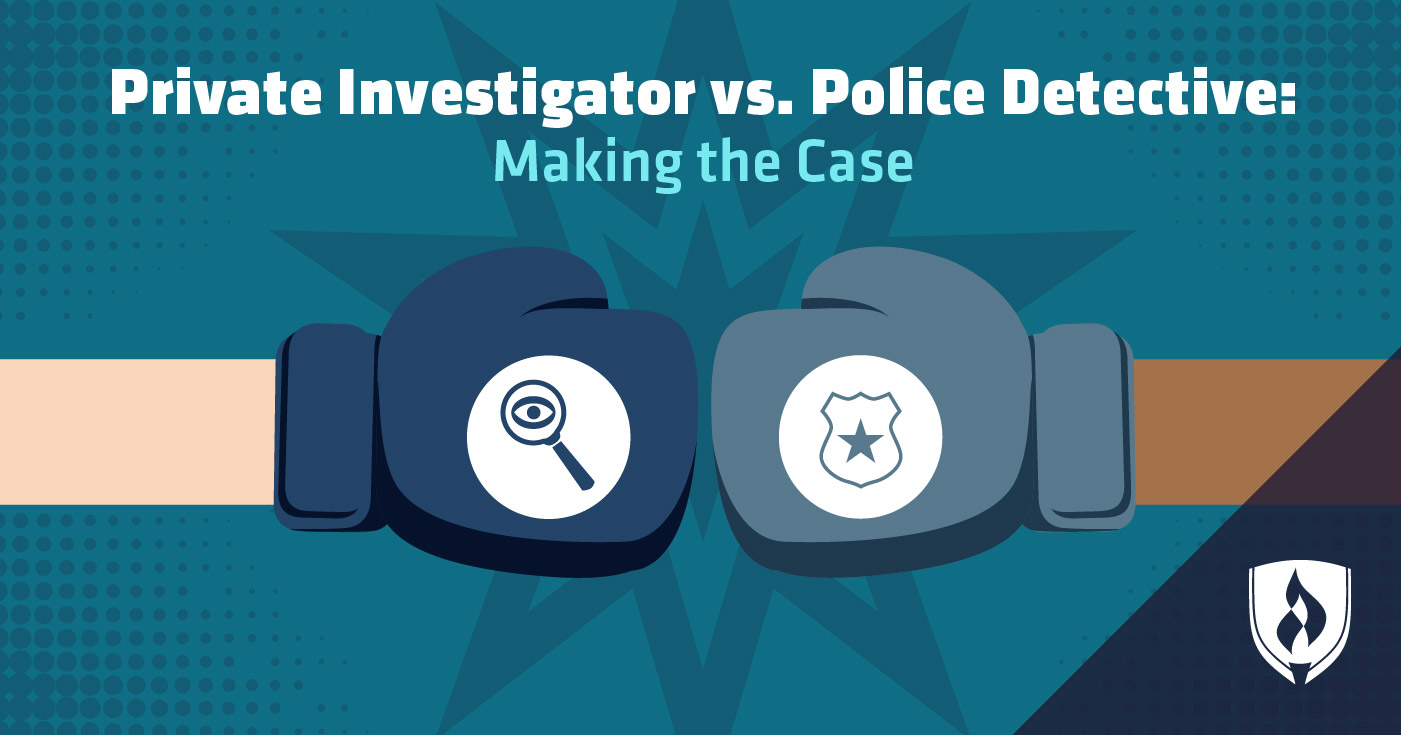
You’ve seen the movies: a big crime scene is being taped off when the detective arrives to gather clues and discover evidence before trying to solve the mystery or find the perpetrator. But wait, who is that person working with pen and pad, detailing all of the evidence—are they a police detective, or are they a private investigator?
Though things are always different in the movies, the case of private investigator versus police detective can be a tricky one. That’s why we gathered all of the facts to brief you on the differences between these two criminal justice careers.
Examine the evidence for yourself and determine which career is right for you.
What do private investigators do?
Private investigators, sometimes called private detectives, work directly for clients or individuals who pay them for their investigative services. These services are typically financial, legal or personal matters. While police detectives are involved only in criminal activity, private investigators are involved in private sector issues like civil litigation, matrimonial matters, civil fraud cases and locating witnesses in in civil suits, according to Sinai Megibow, a private investigator for Radius Investigations in New York.
Private investigators might help a client find a missing relative, or investigate a suspicious spouse. They can even become involved in criminal cases when hired by attorneys or businesses. Private investigators dedicate much of their time to surveillance, and often work irregular hours.
What do police detectives do?
Unlike private investigators, police detectives are members of a police department or law enforcement agency. This means that police detectives can work for local, state or federal levels, and serve a community as supported by taxes. For example, a police detective might work as a part of a police department, like the NYPD or LAPD.
Within their jurisdiction, police detectives are responsible for investigating crimes and determining who the perpetrator was and why it happened. They work directly with witnesses and suspects, interviewing them and investigating any available clues or evidence. They’re responsible for writing official reports compiling the information they gather.
One notable difference between police detectives and private investigators is that police detectives CAN make arrests, while private investigators cannot.
Private investigator vs. police detective: Education requirements
It’s true that some former police officers or detectives later become private investigators, but this is not always the case. There is no official requirement to have any law enforcement experience to become a private investigator.
There is also no standard education requirement for going this route. However, law enforcement, criminal justice or even law degrees are all practical training options for private investigators. Some advanced positions, like corporate or financial investigators, do have more rigorous educational requirements.
On the other hand, becoming a police detective is typically an advancement opportunity available to existing police officers. So you’ll likely have to serve as a law enforcement officer before being considered for promoting to a police detective. This means earning a minimum of an associate’s degree in law enforcement or criminal justice.
After earning an associate or bachelor’s degree, you must enroll in a police training academy. Here it is required that participants pass different law enforcement classes, including physical fitness tests. Upon graduation, candidates must work as a police officer for several years before being promoted to detective. It varies by agency how many years or how much experience a police officer would need before coming a police detective.
Private investigator vs. police detective: Experience
To become a private investigator in most states, you must be licensed, which typically requires knowledge or experience in law enforcement or as an investigator. Licensure requirements vary by state. For states with experience requirements, working as an assistant in a private investigation firm can provide you the experience required to apply for licensure, while many private investigators are retired cops or police detectives.
Although working in law enforcement and earning experience as an officer is typical for aspiring police detectives, this process is not always the same. “The vetting and promotion process in most police departments means that a newcomer could be waiting many years to earn his detective's badge” says Brad Robinson, former CIA agent and now senior partner of private investigation firm The Millenium Group. But Robinson says that one can become a private investigator fairly quick.
Private investigator vs. police detective: Job outlook
It turns out the wait might be worth it. Robinson emphasizes that police detectives can rely on regular paychecks every month, while private investigators must drum up business and rely on clients for their own success.
The BLS projects employment for private investigators to increase by 11 percent through 2022, compared to a projected rise of 2 percent for police detectives.
Private investigator vs. police detective: The bottom line
Both criminal justice careers have pros and cons. Private investigators can be their own boss, sometimes even choosing who to work with and which cases to pursue. This also means paychecks may be irregular, though rewarding if you are willing to put in the work.
Police detectives are members of a police force where assignments or cases come to them, answering to superiors, but with the security of a steady paycheck and strong benefits. Both require hard work, dedication and a watchful eye—think you have what it takes?
If you are interested in careers in criminal justice or law enforcement, check out the Rasmussen College School of Justice Studies.
*Data represents national, averaged earnings for the occupations listed and includes workers at all levels of education and experience. Employment conditions in your area may vary.




